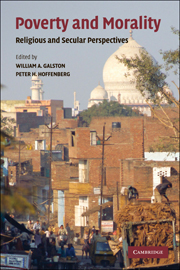Book contents
- Frontmatter
- Contents
- Contributors
- Acknowledgments
- 1 Introduction
- 2 Global Poverty and Unequal Development
- 3 The Karma of Poverty
- 4 Poverty and Morality in Christianity
- 5 Classical Liberalism, Poverty, and Morality
- 6 Confucian Perspectives on Poverty and Morality
- 7 Poverty and Morality
- 8 Hinduism and Poverty
- 9 The Problem of Poverty in Islamic Ethics
- 10 Jewish Perspectives on Poverty
- 11 Liberal Egalitarianism and Poverty
- 12 Marxism and Poverty
- 13 Poverty and Natural Law
- 14 Afterword
- Select Bibliography
- Index
6 - Confucian Perspectives on Poverty and Morality
Published online by Cambridge University Press: 05 June 2012
- Frontmatter
- Contents
- Contributors
- Acknowledgments
- 1 Introduction
- 2 Global Poverty and Unequal Development
- 3 The Karma of Poverty
- 4 Poverty and Morality in Christianity
- 5 Classical Liberalism, Poverty, and Morality
- 6 Confucian Perspectives on Poverty and Morality
- 7 Poverty and Morality
- 8 Hinduism and Poverty
- 9 The Problem of Poverty in Islamic Ethics
- 10 Jewish Perspectives on Poverty
- 11 Liberal Egalitarianism and Poverty
- 12 Marxism and Poverty
- 13 Poverty and Natural Law
- 14 Afterword
- Select Bibliography
- Index
Summary
It is difficult to essentialize any tradition, but for various reasons Confucianism seems more difficult than most. For one, Confucianism lacks the kind of doctrinal statements that characterize many religious traditions, and there are no noble truths as in Buddhism or creeds as in Christianity. Over centuries, however, there did emerge a constructed lineage of authorities whose writings have attained both intellectual and official acceptance as orthodox Confucianism.
Although there is no Confucian scripture with prophetic claims, from the very start Confucianism embraced a curriculum, and it has always held learning to be a central activity. Confucius (552–479 bce) himself stressed knowledge of the poetic, historical, and ritual tradition that was already centuries old, and in this sense “Confucianism” can be said to antedate Confucius, who spoke of himself as the transmitter of an ancient tradition rather than the inventor of a new one. Within a century or two of Confucius’s death, this curriculum comprised Five Classics, works the mastery of which was deemed to be fundamental to the training of a junzi or gentleman. In later times these works were superseded by the more familiar Four Books, which included the major canonical writings of Confucius’s Analects and the writings of Mencius (391–308 bce).
- Type
- Chapter
- Information
- Poverty and MoralityReligious and Secular Perspectives, pp. 115 - 133Publisher: Cambridge University PressPrint publication year: 2010



